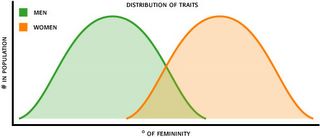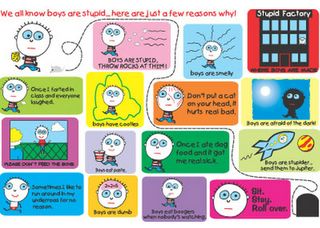Tuesday, June 28, 2005
Mid-Term due time
Gulp! - I Found the Quotation ....
I am naturally reluctant to read it in class, but I was able to contact our Vistor and ask if he would write out the words from the reference I sent him. Of course, as Head of the Congregation for the Doctrine of the Darwinian Faith, he could not refuse, so here is his quotation from the Descent of Man, from the specific reference I gave him:
It is generally admitted that with woman the powers of intuition, or rapid perception, and perhaps of imitation, are more strongly marked than in man; but at least some of these faculties are characteristic of the lower races [i.e. non-white], and therefore of a past and lower state of civilisation." Descent of Man, 1896, 563-564.And, once again, dear class, remember your signed "Waiver"-- do not attribute these views to the course instructor!
St. Paul & Darwin on Husbands & Wives
And here's the Bible passage from Ephesians 5:22-33 (New International Version):Wives, submit to your husbands as to the Lord. For the husband is the head of the wife as Christ is the head of the church, his body, of which he is the Savior. Now as the church submits to Christ, soWe'll discuss this in seminar Wednesday, but my comments are that, as I read it now for the first time in some years, it seems entirely different from what Darwin said about women -- as we had it read to us by our visitor today. Darwin was clear and prolix- "men are superior to women" and in a great list of charateristics - courage, strength, intelligence, imagination, creativity etc etc -- with the only exceptions being maternality and vanity.
also wives should submit to their husbands in everything. Husbands, love your wives, just as Christ loved the church and gave himself up for her to make her holy, cleansing her by washing with water through the word, and to present her to himself as a radiant church, without stain or wrinkle or any other blemish, but holy and blameless. In this way, husbands ought to love their
wives as their own bodies. He who loves his wife loves himself. After all, no one ever hated his own body, but he feeds and cares for it, just as Christ does the church -- for we are members of his body. For this reason a man will leave his father and mother and be united to his wife, and the two will become one flesh. This is a profound mystery -- but I am talking about Christ and the church. However, each one of you also must love his wife as he loves himself, and the wife must respect her husband.
Ephesians, on the other hand, above talks only about _marriage_ -- and even there there is (a) reciprocity and (b) the quite remarkable -- indeed anti-Darwinian -- statement that men and women are _one flesh_. I just looked up what the Bible says about men & women, and it there it strangelyseems to emphasise their equality. As came up in class, the fifth Chapter (vs 1-2) of Genesis says that God is both male _and_ female:
... God created man, in the likeness of God made He him; male and female created He them;And St. Paul on men and women says this (Galatians 3:28
... there is neither male nor female: for ye are all one in Christ Jesus.Again, your responses & developments are encouraged during seminar on Wednesday; but this does, prima facia, seem very different in spirit than "men are stronger in mind and body than women", and of course this from Descent of Man:
[Men have] a higher eminence, in whatever he takes up, than can women- whether requiring deep thought, reason, or imagination, or merely the use of the senses and hands. If two lists were made of the most eminent men and women in poetry, painting, sculpture, music(inclusive of both composition and performance), history, science, and philosophy, with half a dozen names under each subject, the two lists would not bear comparison. We may also infer, from the law of the deviation from averages, so well illustrated by Mr. Galton, in his work on 'Hereditary Genius' that..the average of mental power in man must be above that of women.And so this is why I would not read Darwin's scientific assessment of women to the class! I would hate it to be thought that I endorsed such misogyny -- let alone this extreme.
[Update: "and" changed to "as" in the Ephesians quotation, thanks to a comment below.]
Mantropy
It's another move in the growing counter-reformation against metrosexuality, here labelled "mantropy" - as in, metrosexuality is causing male virility to wane. I cite it here singularly for it's lad-lit element:
Andy McNab, the forAndy McNab, the former SAS officer and best-selling novelist, said there was already evidence that some men were reconnecting with their masculinity in a bid to make themselves more attractive to women.
Sunday, June 26, 2005
Lad-lit: Canadian and non-fiction.
The Toronto Globe and Mail has the book's first chapter available online, and the following passage is worth our attention - especially as it echoes some of the ideas I've suggested in class.
Women appear in some of the stories too. Even when they're not on the scene, their absence is a kind of presence. Women keep an eye on men and exert a moderating influence on their behavior. That's one of the reasons that men like to occasionally get away from them. The singer Garth Brooks once remarked that he was teaching his little daughters a simple concept: "Men are pigs." All men know this about themselves, and they think it's funny. But at the same time, they have their own gender-specific code of ethics. Some kinds of piggy behavior are allowed, and some aren't. There are hundreds of rules affecting male behavior. That's too many to list here, and in any case every guy knows them. But women might find the male codebook strange and interesting. Women, for example, commonly assume that men like to talk about their spouses or sweethearts with their buddies. This is what psychologists call "projection." Women do it, so they think men do it too. A woman will happily dump the entire kitbag of her romantic woes on the table for the amusement of some other woman she's met four minutes ago. But no matter how late the evening or how debauched the conversation, you'll seldom hear a man say more than a few neutral words in passing about his mate. In the male codebook, talking about your love life is considered to be craven and unmanly. So women can at least relax about that.
Darwin's Writings on Women
Mid-Term Essay Due
They may be handed in earlier, of course, but not later -- to avoid the specified grade penalty....
Thursday, June 23, 2005
We Hit The Canadian Media
Broadcast Thursday 10:00, FM 90.5 or AM 690.
Monday, June 20, 2005
Apologia contra Doctrinaria
In fiction, I look to find agonism; I delight in dialectic; I rejoice to experience subtlty, balance, open-endedness; diversity in fiction is a golden attribute. Fiction -- novel and short story -- is an entirely uncongenial mode for phillipic, invective, diatribe and polemic. Any putative fiction by Ayn Rand is utterly unreadable for me: it is an aggregation of words; not art.
Thus, I amiably resist any attempt to reduce works that I consider great fiction into tools for the propagation of an ideology. Thus, when I say that I cannot pin Cranford down to any hard background, I am paying it my highest literary compliment. At the asme time, I recognise that this is merely my own bent, and I enjoy few things better than a vigourous exchange with some fellow scholar who affirms that a work which I find diverse is in fact a work designed to promote this or that dogma.
This sensibility of mine is companion to a broader feeling I have: to wit, that I deplore and am saddened by ideologues in life - academic life especially. When a colleague moves from a friendly explanation and advocacy of a personal system of belief or social ideology -- Marxism, say -- to grim-faced disapproval of and censoriousness toward non-agreement, my heart becomes heavy and, too often, the colleague turns face away from sweet converse.
At Simon Fraser, needless to say, exchanges are nearly always a source of joy and enlightenment. May it ever be so.
Sunday, June 19, 2005
Sense on Student Coffee Cents
A café is not just the coffee. It is an entire hours-long experience that contributes to your success as a student. It's true that to be financially savvy you have to realize that you spend a lot of money by spending a small amount of money on a daily basis, but there are much worse daily expenses that call out to students: bars, movies, cigarettes, fatty snacks.
Saturday, June 18, 2005
Post Update: "Differences between the Sexes?"
Friday, June 17, 2005
Group Blogging Project Bleg
Please also add your group's ideas for publicising your blog ....
Thursday, June 16, 2005
Mid-Term Essay
Nb. It is of course possible to argue that the two novels are in fact two of the same type of work and belong in the same genre. You are welcome to make this just this argument; in which case your assignment will be to show how what appears to be difference is in reality identity.
Sunday, June 12, 2005
Differences Between the Sexes?
".... exploring how knowledge can be reshaped when women are included."The concensus of your views, summarised as tightly as possible, is that differences exist, none are innate and all are the consequence of cultural influence, and qualities of masculinity and femininity can be possessed by either men and women as a matter of choice. One student sends the following chart of overlapping distribution curves as her summary of your seminar discussion.

The definitive academic debate -- between Spelke & Pinker - was blogged in one of my earlier posts here.
A class-fellow sends along a link to another helpful article in this regard.
And here's another helpful class-fellow who has the "Nerve" to add the following caveat:
I just wanted to forward you the link to this article by an avid reader of Chick Lit. It's quite a nuanced commentary albeit somewhat colloquial. Enjoy!
Update:
The above graph from a classfellow has proved very helpful in its visual representation of your discussions on this thread. Its overlapping y axese of femininity and masculinity were a starting-point for another classfellow to elaborate the seminar understanding of those qualities.
Specifically, each y axis is the aggregation of a number of particular graphs that map data points of some specific behavior observed in one sex or the other: watching the "W" network for one instance; eating beef jerkey for another; and so on.
The explanatory advantage of this development is that the extra-literary question of the cause of each separate behavior is left open -- nature or nurture for example -- and freedom of individual movement on any one behavior (changing the channel or drinking cosmopolitans instead of eating beef jerkey) is represented.
Your thoughts?
Support for our Course Thesis
Well, well....
An essential article for our course in today's online Guardian, here: we'll review it together in seminar this week. I wanted to excerpt the pith, but it seems to be all pith. Certainly it addresses concisely and vigorously some of the genre issues with which we have been engaging.
It follows on this earlier piece, from last week, sub-titled "Research shows men mainly read works by other men."
[Credit to class-fellow "Steve" for coming across this on his own & posting in a "comment" below.]
Teen Chick & Lad Lit
I think the existence of these 97 titles, currently in print would qualify it as a genre.
Also, I get the feeling The Babysitter's Club and Sweet Valley High would count as teen chick lit -- at least these are what my sister was reading when she was in her early teens. On the other hand, there are not a lot of lit geared towards young boys -- I suppose it is hard enough to get boys away from their computers, TVs, and X-Boxes, let alone convince them to read a novel.
I know Harry Potter has dramatically improved young readership, but I wonder what boys think about reading books written by a woman? Do they think about it? I used to love reading Judy Blume novels, but I think I had some qualms about it nonetheless.
No "Democracy" on MSN Spaces
Microsoft's new Chinese internet portal has banned the words "democracy" and "freedom" from parts of its website in an apparent effort to avoid offending Beijing's political censors.
Blogging is the antithesis of totalitarianism, so this is Big News in the blogosphere.
Teen Chick-Lit
My prediction is that this will be an emergent genre ....
Kitsch: of Men and Women
The first was a fridge magnet collection sold in the SFU BookStore:

The second was a metal plate found at a garage sale entitled "The Rules" and which read as follows:
1. The Female always makes THE RULES.
2. THE RULES are subject to change without notice.
3. No Male can possibly know all THE RULES.
4. If the Female suspects the Male knows all THE RULES, she must immediately change some of THE RULES.
5. The Female is never wrong.
6. If it appears the Female is wrong, it is because of a flagrant misunderstanding caused by something the Male did or said wrong.
7. If Rule #6 applies, the Male must apologize immediately for causing the misunderstanding.
8. The Female can change her mind at any time.
9. The Male must never change his mind without the express written consent of The Female.
10. The Female has every right to be angry or upset at any time.
11. The Male must remain calm at all times, unless the Female wants him to be angry or upset.
12. The Female must, under no circumstances, let the Male know whether she wants him to be angry or upset.
13. The Male is expected to read the mind of the Female at all times.
14. At all times, what is important is what the Female meant, not what she said.
15. If the Male doesn't abide by THE RULES, it is because he can't take the heat, lacks backbone, and is a wimp.
16. If the Male, at any time, believes he is right, he must refer to Rule #5.
From among the exchanges, two stick in my mind. One is the way that The Rules - highlight male insecurity. The other was the suggestion that if "the Female" in The Rules is changed to "God", then you have sixteen points of understanding Kafka's conception of God.
But one class-fellow felt hindered from speaking, and emailed me the following very commendable commentary.
My personal response to popular examples of "kitsch" such as 'TheRules' andthe "boys are stupid" magnets is very unsettling. More than the objectsthemselves, what I find especially disturbing is that these sorts of blatant exploitations of gender stereotypes are intended to be funny. 'The Rules'example in particular operates on exactly the same logic that allowed womento be oppressed for centuries, yet a simple gender reversal apparently makesit appropriate to laugh at today. I think any sort of humor that operates on the principle that a certain sex is contemptible because they necessarily possess some undesirable trait is unacceptable. It is offensive not only to the targeted gender but any person who doesn't feel like they fit theprescribed role
for their sex. For instance, I feel insulted by theinsinuation that the female is always the pushy, overbearing partner in arelationship, and while most children experience a certain amount of antagonism towards the opposite gender at some point, I certainly don't seehow it's appropriate to encourage them to deal with it by throwing rocks. Despite all the intellectualizing university students do about gender theory and social conditioning, the existence of humor like this makes me question whether sexism hasn't simply been institutionalized.
Sunday, June 05, 2005
Salon.com Validates "Chick-Lit"
The liberal proto-blog salon.com has this recommendation for summer reading - and in the process validates the use of the term "chick-lit" for the left side of the blogosphere.
[Speaking precisely, salon.com and slate.com aren't blogs, since they are corporate and have editors. However, in their genesis they had the blog mentality, and they do include in-house blogs - kausfiles at slate is excellent. Their conservatice equivalents are probably nationalreview.com and lucianne.com - and instapundit.com is the blogfather.]
Genre Debate: chick-lit
Colin Firth - Again
If it is true that there are only four stories, then Pride and Prejudice must be one of them. Poor but proud woman spurns and loves rich, humourless man. Women consistently vote for Pride and Prejudice as their favourite novel, ever. Mr Darcy remains the most romantic figure created, ever.And also this:
Dignity is perhaps the most important thing in a romantic hero, which is why Hugh Grant was always going to lose out to Firth. The greatest fantasy figures - Mr Rochester, Maxim de Winter, Heathcliff - are all grumpy.And again this:
They are also, I am afraid to say, men of means. Women can run off with the poor and light-hearted (and usually artistic) - as Dorothea Brooke did when she chose Will Ladislaw, but it was not really very satisfactory, was it? I am still suspicious when women describe their menfolk as "supportive". It usually means economically unsupportive, and they tumble down the romantic league table.
And yet more, this to be relevant when we get to BJD:
Working Title is proud of its contemporary Elizabeth Bennet in Keira Knightley. No bodices and bonnets here. You would not be surprised to see Lizzy rolling a cigarette on the kitchen table. By contrast, Matthew Macfadyen is resolutely period, with a deep voice and breeches.To all of which I say, "Cad, curate & Colin Firth"!
Ladette
ladette (also less frequent laddette) /lædet/ noun (BrE, informal)
a young woman who behaves in a confident and noisy way, and who drinks alcohol and enjoys sport or other activities that are traditionally enjoyed by men: 17-year-old Zola and her gang of ladettes boast about just how much under-age drinking they did last weekend.* He says that young women today may look at someone like Sophia Loren and admire the way she looks, but they aspire more to being sexy, pretty or a ladette. * She has also had a reputation as a hard-drinking, hard-partying ladette who seems to enjoy the single life. * Analysts believe the ladette phenomenon has been driven by increasing levels of financial independence among young women.
Ladette comes from the word lad, which originally meant a boy or young man. In Britain in recent years, lad has been used more often to describe a lively young man who is interested in drinking, sports and meeting women: All my other mates said he was a bit of a lad, always making trouble. Robert has a reputation as a bit of a lad. He dates lots of women and flirts with any attractive female. Young men have their range of lad mags (= magazines for young men), but what magazine is a man over 40 supposed to buy exactly? Boys who don’t fit in with the ‘lad culture’ feel left out and often get bullied at school, according to a 2001 survey.The -ette ending has been added to make the feminine form.Other derivatives include:
- laddish (adjective): Traditional laddish behaviour is generally a sign of
insecurity and immaturity. His quick wit and likeable brand of laddish humour make him the perfect chat-show guest.- laddishness (noun): Behind all the laddishness, he is rather a sensitive young man.
- laddism (noun): Beginning as a journalistic pigeon-hole for boisterously
anti-social young men, laddism has since been extended to include anyone under 40 behaving badly.A lad can be contrasted with a new man, a man who is more sensitive and not aggressive, and who shares the work traditionally done by women in the home, such as cooking and taking care of children: He is comfortable with his ‘new man’ image, and has been known to leave the office early to go home and cook dinner for his family.
Friday, June 03, 2005
Why Blogs are Great: # 87692.
Ha, as they say, ha. [Via Instapundit.]
Nb. This is a blog riff on Godwin's Law: "As an online discussion grows longer, the probability of a comparison involving Nazis or Hitler approaches one."
In my experience -- all too lengthy -- Godwin's Law is infalliable.
Chick-Lit Defined
The series of pictures here were taken at Coles Books in Lougheed Mall. They help establish a functionalist definition of Chick-Lit. Recall in lecture that we decribed three ways of defining literary genres: the essentialist, the genetic and the funtionalist. So, according to functionalism, the genre of chick-lit is those books marketed as chick-lit.
Coles Books -- an excellent pruveyor of fine books -- tells us as much.

Here is their shelf display dedicated to the romance genre - which is exclusive of chick-lit. Proportionally a large percentage of the store. Not counting the genreal fiction section, only the science fiction & fantasy and the youth fiction genres are comparable. Pictures of their sections are below.
Nb. Click on each photograph for a larger image.


Useful & Engaging Articles.
The first (from the formerly Manchester) Guardian was found via the indispensible Arts & Letters Daily and relates to our discussion -- also the topic of Maggie Holland's class presentation -- of whether or not a non-sexed reading of fiction is possible. Its title is "How male or female is your brain?" and contains a link to a pair of elaborate tests of your own brain.
The second, from the New York Times, is scientifically-directed also, and specifically on Darwinism and the "Urge to Win" in men & women. This is obviously pertinent to the question raised in lecture of how relevant Charles Darwin's theory of sexual selection -- with its assigning of aggression to males & calm power of decion to females -- is to an understanding of the genres of chick-lit and lad-lit.
The third is more whimsical: an article from the BBC that says in so many words that Rob Roy is dead, under the title "Chivalry is a no-win battle for men." This is followed by a good overview of the vestigal status of chivalry today, with some helpful itemised tenets of chivalry, taken from 14th Century texts.








